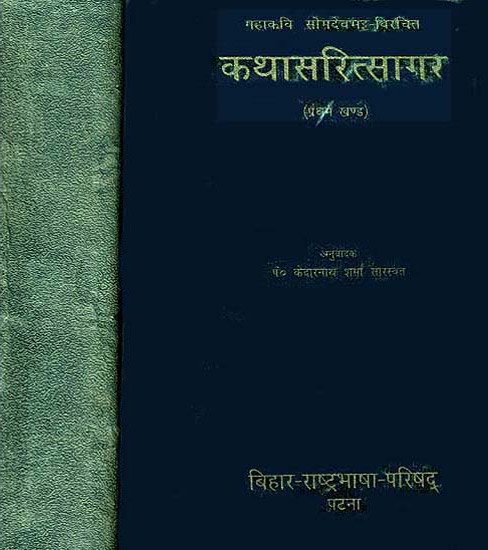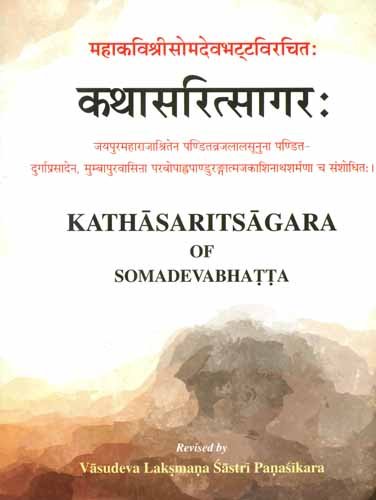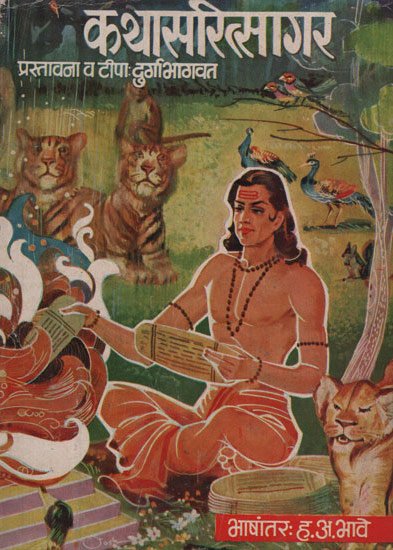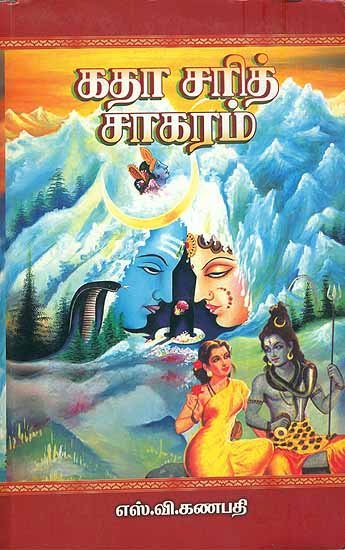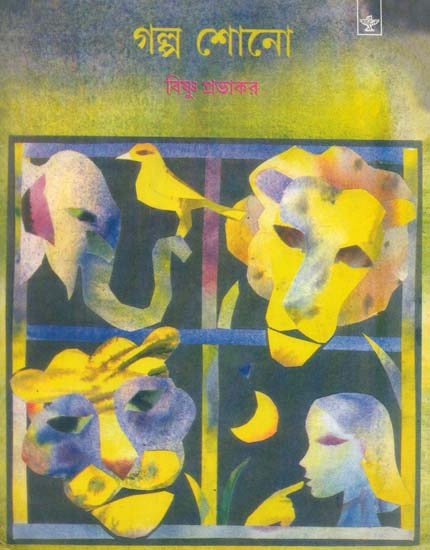Kathasaritsagara [sanskrit]
by C. H. Tawney | 2014 | 226,424 words | ISBN-13: 9789350501351
The Sanskrit edition of the Kathasaritsagara referencing the English translation and grammatical analysis. Written by Somadeva and dating from the 12th century, the Kathasaritsagara (or Katha-sarit-sagara) represents an epic legend narrating the adventures of Naravahanadatta as he strives to become the destined emperor of the Vidyadharas. Alternative titles: (Kathāsaritsāgara, कथासरित्सागर, Kathā-sarit-sāgara)
Verse 17.5.196
सधैर् यजलधिस्तु ताम् अपिविचिन्त्य मुक्ताफलध्वजो ऽसुरपतेः सुतां दृढनिबद्धभावां युवा ।
मुनीन्द्रमनसाम् अपिस्मरविकारदां ज्यायसीं पुरार्थितवरो मुनेर्न खलु चुक्षुभे चेतसा ॥ १९६ ॥
sadhair yajaladhistu tām apivicintya muktāphaladhvajo 'surapateḥ sutāṃ dṛḍhanibaddhabhāvāṃ yuvā |
munīndramanasām apismaravikāradāṃ jyāyasīṃ purārthitavaro munerna khalu cukṣubhe cetasā || 196 ||
The English translation of Kathasaritsagara Verse 17.5.196 is contained in the book The Ocean of Story by C.H. Tawney. This book is available online or you could buy the latest edition:
Read online Buy now! The English translation by C.H. Tawney (2014)
Glossary of Sanskrit terms
Note: This extracts Sanskrit terms and links to English definitions from the glossary, based on an experimental segmentation of verse (17.5.196). Some terms could be superfluous while some might not be mentioned. Click on the word to show English definitions.
Sadha, Yaja, Dhi, Api, Vicintya, Muktaphaladhvaja, Asurapati, Sut, Suta, Dridha, Nibaddha, Bhava, Yuva, Yuvan, Munindra, Anas, Smara, Vikara, Jyayas, Pura, Pur, Arthita, Vara, Varas, Muni, Khalu, Cetas,
Analysis of Sanskrit grammar
Note: this is an experimental feature and only shows the first possible analysis of the Sanskrit text (Kathasaritsagara Verse 17.5.196). If the system was successful in segmenting the sentence, you will see of which words it is made up of, generally consisting of Nouns, Pronouns, Verbs, Participles and Indeclinables. Click on the link to show all possible derivations of the word.
- Line 1: “sadhair yajaladhistu tām apivicintya muktāphaladhvajo 'surapateḥ sutāṃ dṛḍhanibaddhabhāvāṃ yuvā ”
- sadhair -
-
sadha (noun, neuter)[instrumental plural]
- yaja -
-
yaja (noun, masculine)[compound], [vocative single]√yaj (verb class 1)[imperative active second single]
- la -
-
la (noun, masculine)[compound], [vocative single]
- dhis -
-
dhi (noun, masculine)[nominative single]
- tu -
-
tu (indeclinable particle)[indeclinable particle]
- tām -
-
tā (noun, feminine)[accusative single]sā (noun, feminine)[accusative single]
- api -
-
api (indeclinable preposition)[indeclinable preposition]ap (noun, neuter)[locative single]
- vicintya -
-
vicintya (noun, masculine)[compound], [vocative single]vicintya (noun, neuter)[compound], [vocative single]
- muktāphaladhvajo' -
-
muktāphaladhvaja (noun, masculine)[nominative single]
- asurapateḥ -
-
asurapati (noun, masculine)[ablative single], [genitive single]
- sutām -
-
sut (noun, masculine)[genitive plural]sut (noun, neuter)[genitive plural]sutā (noun, feminine)[accusative single]√su -> sutā (participle, feminine)[accusative single from √su class 5 verb]√sū -> sutā (participle, feminine)[accusative single from √sū class 6 verb]√sū -> sutā (participle, feminine)[accusative single from √sū class 2 verb]√su (verb class 2)[imperative active third dual], [imperative middle third single]
- dṛḍha -
-
dṛḍha (noun, masculine)[compound], [vocative single]dṛḍha (noun, neuter)[compound], [vocative single]
- nibaddha -
-
nibaddha (noun, masculine)[compound], [vocative single]nibaddha (noun, neuter)[compound], [vocative single]
- bhāvā -
-
bhāva (noun, masculine)[compound], [vocative single]√bhā (verb class 2)[imperative active first dual]
- am -
-
a (noun, masculine)[adverb], [accusative single]ā (noun, feminine)[adverb]e (noun, masculine)[accusative single]
- yuvā -
-
yū (noun, masculine)[instrumental single]yuvā (noun, feminine)[nominative single]yuvan (noun, masculine)[nominative single]
- Line 2: “munīndramanasām apismaravikāradāṃ jyāyasīṃ purārthitavaro munerna khalu cukṣubhe cetasā ”
- munīndram -
-
munīndra (noun, masculine)[adverb], [accusative single]munīndrā (noun, feminine)[adverb]
- anasām -
-
anas (noun, neuter)[genitive plural]
- api -
-
api (indeclinable preposition)[indeclinable preposition]ap (noun, neuter)[locative single]api (Preverb)[Preverb]
- smara -
-
smara (noun, masculine)[compound], [vocative single]smara (noun, neuter)[compound], [vocative single]√smṛ (verb class 1)[imperative active second single]
- vikāra -
-
vikāra (noun, masculine)[compound], [vocative single]
- dām -
-
dā (noun, feminine)[accusative single]dā (noun, masculine)[accusative single], [genitive plural]
- jyāyasī -
-
jyāyas (noun, masculine)[locative single]jyāyas (noun, neuter)[nominative dual], [vocative dual], [accusative dual], [locative single]
- im -
-
i (noun, masculine)[accusative single]
- purā -
-
purā (indeclinable)[indeclinable]pura (noun, masculine)[compound], [vocative single]pura (noun, neuter)[compound], [vocative single]pur (noun, feminine)[instrumental single]purā (noun, feminine)[nominative single]√pur (verb class 6)[imperative active second single]
- arthita -
-
arthita (noun, masculine)[compound], [vocative single]arthita (noun, neuter)[compound], [vocative single]
- varo* -
-
varas (noun, neuter)[compound], [nominative single], [vocative single], [accusative single]vara (noun, masculine)[nominative single]
- muner -
-
muni (noun, masculine)[ablative single], [genitive single]
- na -
-
na (indeclinable particle)[indeclinable particle]na (noun, masculine)[compound], [vocative single]na (noun, neuter)[compound], [vocative single]
- khalu -
-
khalu (indeclinable)[indeclinable]khalu (noun, masculine)[compound], [adverb]khalu (noun, feminine)[compound], [adverb]khalu (noun, neuter)[compound], [adverb], [nominative single], [vocative single], [accusative single]
- cukṣubhe -
-
- cetasā -
-
cetas (noun, neuter)[instrumental single]
Other editions:
Also see the following editions of the Sanskrit text or (alternative) English translations of the Kathasaritsagara Verse 17.5.196
Kathasaritsagar
by Kedarnath Sharma Saraswat (2005)
The Only Edition with the Sanskrit Text and its Hindi Translation (An Old and Rare Book) Set of 3 Vol.
Buy now!
Kathasaritsagara of Somadeva Bhatta (Sanskrit Text Only)
by Vasudeva Laksmana Sastri (2013)
Katha Sarit Sagar in Marathi
by H. A Bhave (1995)
Set of 5 Volumes; Published by Varada Books, Pune. 2256 pages (Throughout B/W Illustrations).
Buy now!
Katha Sarit Sagara (Tamil)
by S. V. Ganapati (எஸ். வி. கணபதி) (2014)
[கதா சரித் சாகரம்] Published by Alliance Publications.
Buy now!
Galpa Shono
by Abhijit Chattopadhyay (2014)
[গল্প শোনো] Galpa Shono: Bengali Translation of 'Suno Kahani From Katha Sarit Sagar'; 9788126015436; Published by Sahitya Akademi, Delhi.
Buy now!Preview of verse 17.5.196 in Bengali sript:
সধৈর্ যজলধিস্তু তাম্ অপিবিচিন্ত্য মুক্তাফলধ্বজো ঽসুরপতেঃ সুতাং দৃঢনিবদ্ধভাবাং যুবা ।
মুনীন্দ্রমনসাম্ অপিস্মরবিকারদাং জ্যাযসীং পুরার্থিতবরো মুনের্ন খলু চুক্ষুভে চেতসা ॥ ১৯৬ ॥
![Kathasaritsagara [sanskrit] - book cover](/uploads/a/Katha-Sarit-Sagara.jpg)
